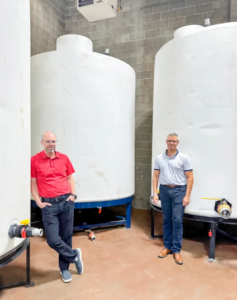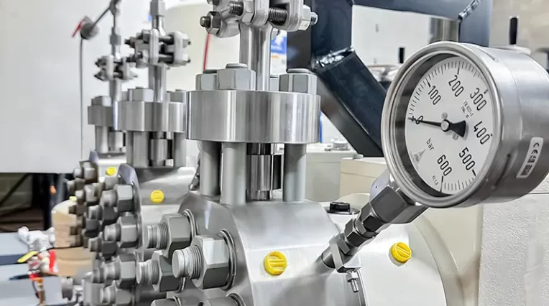Imagine a process that turns waste into a resource at no cost to the waste producer. Does it sound too good to be true? That is exactly what NULIFE is accomplishing.
Jerry Kristian, co-founder of NULIFE, says, “We use our patented hydrothermal liquefaction to convert high moisture industrial waste into sustainable bio-oil at no extra cost to the waste generator. We solve a real problem of waste disposal, save waste generators money, reduce CO2 emissions and create a sustainable and valuable bio-oil.”
“Essentially, wet waste goes in, gets processed using heat and pressure, and marketable bio-oil comes out. The water, heat and pressure used in the process are reused, creating an extremely efficient and zero-waste process.”
The process supports carbon removal and offsets in two ways: by removing carbon from the waste stream which would decompose and emit CO2 into the atmosphere, with the option to also reduce the amount of oil pulled out of the ground.
 Kristian and co-founder Brock Eidem decided to go into business together to create something that would make the world a better place for their kids. After learning about hydrothermal liquefaction overseas, Kristian had noticed that the applications were not well commercialized. Drawing on their strong business backgrounds, Kristian and Eidem knew that by creating a profitable business model, they could maximize their impact. They launched their business, built their design team, developed the process, and are now commercializing, with patents approved in Canada and the U.S., and others pending.
Kristian and co-founder Brock Eidem decided to go into business together to create something that would make the world a better place for their kids. After learning about hydrothermal liquefaction overseas, Kristian had noticed that the applications were not well commercialized. Drawing on their strong business backgrounds, Kristian and Eidem knew that by creating a profitable business model, they could maximize their impact. They launched their business, built their design team, developed the process, and are now commercializing, with patents approved in Canada and the U.S., and others pending.
Kristian says, “We were ahead of the market when we started in 2016, but in the last two and a half years, the interest in sustainable, cost-effective solutions that solve real problems is exploding. We want to do this without costing more to our clients – and in fact we can save them money.”
Besides creating a marketable product and saving clients money, NULIFE also quantifies the emissions reduction for the waste generators’ sustainability reporting. There are increasing restrictions on waste disposal and per- and polyfluoroalkyl substance (PFAS) contamination, and NULIFE’s process addresses these issues.
Starting a clean tech company in Saskatchewan is not easy, says Kristian. “You must be tough and resilient to start a hard tech company anywhere in the world, and it’s extra challenging in Saskatchewan, where we don’t have a large tech ecosystem – especially clean tech. But if you can make it in Saskatchewan, you can make it anywhere. We also benefit from the farming mentality here – we figure out how to do it, and how to do it for less.”
Kristian acknowledges that the 45 per cent Saskatchewan start-up technology tax incentive helped with raising funds in Saskatchewan and support was received from IRAP and AAFC, as well as MITACS and the superclusters. The ecosystem is changing with organizations like Ag-West Bio, Natural Products Canada, and Foresight. They also work closely with the U of S and Dr. Ajay Dalai, the Canada Research Chair in Bioenergy.
Right now, NULIFE’s core customers are local waste management companies that are drawn to the sustainable solution and reporting benefits. “We’re not trying to be disruptive – we’re trying to fit within the value chain. We want to make it easy for people to save money and reduce their carbon footprint,” says Kristian.
The technology NULIFE has developed is scalable and ready for rapid commercialization. They’ve developed a modular approach and so far, they have successfully processed multiple feedstocks including fats, oils and greases, sewage sludge, agricultural and food processing wastes. The process achieves more than 90 per cent PFAS removal, with no PFOS or PFOA in the output water.
Since 2023, NULIFE is generating revenue and receiving waste from the third largest waste management company in North America, while certification Puro.earth is underway to generate carbon dioxide CO2 removal (CDR) credits. They are looking to source more waste locally to meet capacity of their commercial unit. “Hydrothermal liquefaction bio-oil is much higher quality than other bio-oils like pyrolysis. It can be used for carbon removal, but also for upgrading into low carbon renewable fuels,” says Kristian.
“We’ve been asked why we’re developing this in Saskatchewan. If we can export raw materials from Saskatchewan, we can also export Canadian clean innovation to the U.S. and beyond. If we can prove something in a smaller market, it only increases that opportunity.”
Noelle Chorney is a Saskatoon-based freelance writer.
Photos: supplied by NULIFE GreenTech
Middle: Brock Eidem and Jerry Kristian are co-founders of NULIFE GreenTech
